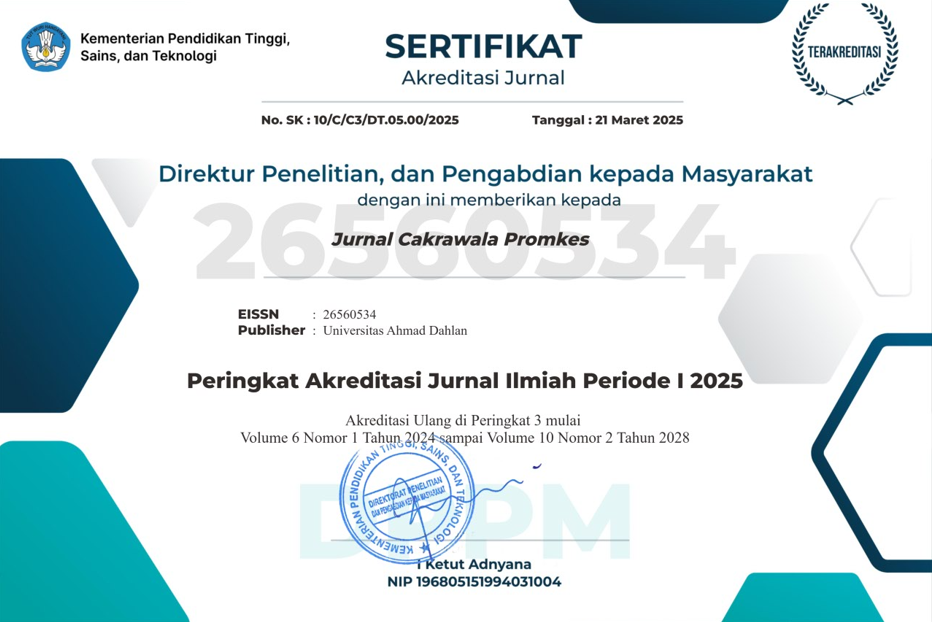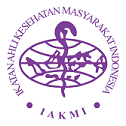Pemanfaatan Pelayanan Kesehatan dan Persepsi dengan Kepatuhan Akseptor Keluarga Berencana (KB) pada Masa Pandemi COVID-19
DOI:
https://doi.org/10.12928/promkes.v4i1.5139Keywords:
acceptors, compliance, family planning, Perception, utilization of health serviceAbstract
Background: The COVID-19 pandemic has had an impact on family planning programs. The government has made a new policy to limit family planning services during the COVID-19 pandemic. As a result, there is a decrease in family planning participation, causing a high risk of an increase in the number of pregnancies and an explosion in the birth rate. Utilization of health services and a good perception of family planning can increase the compliance of family planning acceptors. Objective: This study aims to determine the relationship between the utilization of health services and perceptions with the compliance of family planning acceptors during the COVID-19 pandemic at the Kalasan Health Center, Sleman. Methods: This research method is quantitative with a cross sectional approach. The population in this study were all family planning acceptors at the Kalasan Sleman Health Center with a total of 60 respondents. The sampling technique used was Total Sampling with a total of 53 respondents. Data analysis using Chi Square statistical test and multiple linear regression. Results: Based on the results of the Chi Square test, the variable of utilization of health services and compliance with family planning acceptors, the value of = 0.781 means that the value of >0.05 with multiple linear regression results Sig. 0.728. The results of the Chi Square test of the perception variable with the compliance of family planning acceptors obtained the value of = 0.318, meaning that the value of >0.05 with multiple linear regression values of Sig. 0.452. Conclusion: There is no significant relationship between the utilization of health services and perceptions of compliance with family planning acceptors during the COVID-19 pandemic at the Kalasan Health Center, Sleman Yogyakarta.
References
(1). United Nations [Internet]. Creative Commons license CC BY 3.; 2019. Available from:
https://population.un.org/wpp/Download/Standard/Population/
(2). BPS. Berita resmi statistik Hasil Sensus Penduduk 2020. BpsGoId. 2021;(27):1–52.
(3). Subkhi WB, Mardiansjah FH. Pertumbuhan dan Perkembangan Kawasan Perkotaan di
Kabupaten: Studi Kasus Kabupaten Sleman, Daerah Istimewa Yogyakarta. J Wil dan
Lingkung. 2019;7(2):105–20.
(4). Akhirul, Yelfida W, Iswandi U, Erianjoni. Dampak Negatif Pertumbuhan Penduduk terhadap
Lingkungan dan Upaya Mengatasinya. J Kependud dan Pembang Lingkung. 2020;1(3):76–
(5). Suhandi N, Putri EAK, Agnisa S. Analisis Pengaruh Jumlah Penduduk terhadap Jumlah
Kemiskinan Menggunakan Metode Regresi Linear di Kota Palembang. J Ilm Inform Glob.
;9(2):77–82.
(6). Indonesia R. UUD no. 52 tahun 2009. UUD no 52 tahun 2009 [Internet]. 2009;2(5):255.
Available from: https://jdih.kemenpppa.go.id/peraturan/uu no 52 tahun 2009.pdf
(7). Dampak COVID-19 Terhadap Keluarga Berencana, Kesehatan Ibu, dan Kekerasan Berbasis
Gender [Internet]. [cited 2022 Jan 28]. Available from:
(8). BKKBN. ANTISIPASI BABY BOOM PASCA PANDEMI COVID-19, BKKBN JALANKAN
PELAYANAN KB DENGAN TETAP MENJAGA JARAK DAN KONSELING MELALUI MEDIA
ONLINE [Internet]. 2021 [cited 2022 Jan 28]. Available from:
https://www.bkkbn.go.id/detailpost/antisipasi-baby-boom-pasca-pandemi-covid-19-
bkkbn-jalankan-pelayanan-kb-dengan-tetap-menjaga-jarak-dan-konseling-melalui-media-online
(9). Purwanti S. Dampak Penurunan Jumlah Kunjungan Kb Terhadap Ancaman Baby Boom Di
Era Covid-19. J Bina Cipta Husada. 2020;XVI(2):105–18.
(10). Muslima L, Herjanti H. Pengukuran Faktor yang Mempengaruhi Kepatuhan Akseptor KB
Suntik Ulang 1 Bulan. Serambi Saintia J Sains dan Apl. 2019;7(1):39–51.
(11). Widiani I, Junaid J LL. Faktor-Faktor Yang Berhubungan Dengan Pemanfaatan Pelayanan
Kesehatan Ibu dan Anak di Puskesmas Tomia Timur Kelurahan Tongano Timur Kabupaten
Wakatoni Tahun 2015. 2016; Available from:
http://ojs.uho.ac.id/index.php/JIMKESMAS/article/view/1318
(12). Wahyuni NS. Faktor - Faktor Yang Berhubungan Dengan Pemanfaatan Pelayanan
Kesehatan Di Puskesmas Sumber Rejo Kota Balikpapan Provinsi Kalimantan Timur Tahun
Fakt - Fakt Yang Berhubungan Dengan Pemanfaat Pelayanan Kesehat Di Puskesmas
Sumber Rejo Kota Balikpapan Kalimantan Timur. 2012;4:1–113.
(13). Nanik Sri Wahyuni author. Faktor-faktor yang berhubungan dengan pemanfaatan
pelayanan kesehatan di Puskesmas Sumber Rejo Kota Balikpapan Provinsi Kalimantan
Timur tahun 2012 = Factors associated with utilization of health services in Sumber Rejo
Public Health Center Balikpapan city East Kalimantan province 2012 / Nanik Sri Wahyuni
[Internet]. Universitas Indonesia; 2012 [cited 2021 Oct 15]. Available from:
(14). Aldila D, Damayanti R. Gambaran Peresepsi Terhadap Ragam Alat Kontrasepsi Mkjp Dan
Non Mkjp Wanita Usia Subur (Wus) Di Provinsi Nusa Tenggara Barat. J Ilm Kesehat.
;11(2):101–7.
(15). Noriani, NK, Nurtini NM, Riza Kurnia Indriana P. Hubungan Pengetahuan Dan Motivasi
Akseptor Kb Suntik 3 Bulan Dengan Kepatuhan Kunjungan Ulang Di Bpm Koriawati Tahun
J Ris Kesehat Nas. 2019;3(2):35.
(16). Aqmal R. Pendidikan Keluarga Dan Partisipasi Masyarakat Pada Program Keluarga
Berencana Di Masa Pandemi Covid-19 Desa Kerandin Kecamatan Lingga Timur Kabupaten
Lingga. TANJAK J Educ Teach. 2020;1(2):2013–222.
(17). Kemenkes RI. Panduan Pelayanan Keluarga Berencana dan Kesehatan Reproduksi Dalam
Situasi Pandemi COVID-19. kemenkes RI. 2020;5.
(18). Maisyaqinah, Yurni Suasti RN. Persepsi pasangan usia subur (pus) tentang keluarga
berencana (kb) di wilayah pesisir pantai kecamatan pariaman utara kota pariaman.
;3(1).
(19). Niven N. Psikologi Kesehatan. Jakarta: EGC; 2008.
(20). Bombing CY, Keperawatan F, Waluyo UN. Artikel hubungan nilai budaya dan persepsi
akseptor dengan minat dalam pemilihan alat kontrasepsi iud di puskesmas ambarawa
kabupaten semarang. 2019;1–15.
Downloads
Published
Issue
Section
License
Copyright (c) 2022 Fika Nuri Fathul Jannah, Dian Nur Adkhana Sari

This work is licensed under a Creative Commons Attribution-ShareAlike 4.0 International License.
Authors who publish with JCP: Jurnal Cakrawala Promkes agree to the following terms:
- Authors retain copyright and grant the journal the right of first publication with the work simultaneously licensed under a Creative Commons Attribution License (CC BY-SA 4.0) that allows others to share the work with an acknowledgement of the work's authorship and initial publication in this journal.
- Authors are able to enter into separate, additional contractual arrangements for the non-exclusive distribution of the journal's published version of the work (e.g., post it to an institutional repository or publish it in a book), with an acknowledgement of its initial publication in this journal.
- Authors are permitted and encouraged to post their work online (e.g., in institutional repositories or on their website) prior to and during the submission process, as it can lead to productive exchanges, as well as earlier and greater citation of published work.

This work is licensed under a Creative Commons Attribution-ShareAlike 4.0 International License












